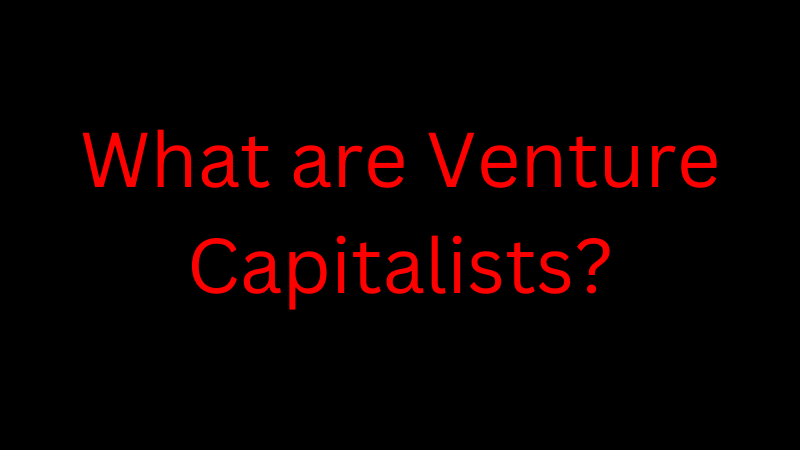What are Venture Capitalists?

Venture Capitalists are individuals or firms that provide financial capital to start-up companies or early-stage businesses in exchange for equity or ownership in the company. They play a crucial role in the entrepreneurial ecosystem by providing the necessary funding and support to bring innovative ideas to life. Below, we will discuss in detail what are venture capitalists, their role in the startup ecosystem, how they operate, and the benefits and drawbacks of working with them.
What are Venture Capitalists?
Venture Capitalists (VCs) are professional investors who manage funds from various sources, including pension funds, wealthy individuals, and institutional investors. These funds are then used to invest in startups that have the potential to grow quickly and generate high returns. VCs typically invest in companies that are at an early stage of development and are looking to raise funds to grow their business. The funds provided by VCs are usually used to hire additional staff, build new products, or expand operations.
VCs also play an active role in the companies they invest in. They provide guidance and mentorship to help entrepreneurs navigate the challenges of building a successful business. VCs have a vested interest in the success of the companies they invest in, as they typically own a significant percentage of equity in the company. This alignment of interests between VCs and entrepreneurs is a key factor in the success of the venture capital model.
How do Venture Capitalists Operate?
VCs operate by raising funds from limited partners (LPs), who are typically institutional investors, high-net-worth individuals, or family offices. These funds are then used to invest in startups that meet the criteria set out by the VC. VCs typically have a set of investment criteria that they use to evaluate potential investments. These criteria can include factors such as the size of the market, the quality of the team, and the potential for growth.
Once a VC has identified a potential investment, it will conduct extensive due diligence on the company. This can involve reviewing financial statements, meeting with the management team, and conducting market research. If the due diligence is successful, the VC will negotiate the terms of the investment with the entrepreneur, including the amount of funding, the valuation of the company, and the terms of the equity investment.
After the investment has been made, the VC will work closely with the entrepreneur to help them grow their business. This can involve providing mentorship, introducing the company to potential customers or partners, and helping the entrepreneur to navigate the challenges of building a successful business.
Types of Venture Capitalists
There are several types of Venture Capitalists, each with its own areas of focus, investment strategies, and requirements for funding. Here are some of the most common types of venture capitalists:
Early-Stage Venture Capitalists
Early-stage venture capitalists typically invest in startups that are still in the seed or early stages of development. They are often willing to take on more risk than other types of venture capitalists in exchange for a potentially higher return on investment.
Growth-Stage Venture Capitalists
Growth-stage venture capitalists invest in companies that have already established a solid product or service and are looking to scale up their operations. These types of venture capitalists typically invest larger amounts of money than early-stage venture capitalists.
Sector-Specific Venture Capitalists
Some venture capitalists specialize in specific sectors or industries, such as healthcare, biotech, or fintech. These venture capitalists have a deep understanding of the specific industry and are often able to provide valuable guidance and expertise to the startups they invest in.
Corporate Venture Capitalists
Corporate venture capitalists are venture capitalists that are backed by large corporations. These venture capitalists typically invest in startups that are aligned with the corporation’s strategic goals or that can provide the corporation with valuable technology or expertise.
Angel Investors
Angel investors are typically high-net-worth individuals who invest in startups in exchange for equity. They often invest in early-stage startups that are too risky for other types of venture capitalists.
Government-Backed Venture Capitalists
Some venture capitalists are backed by government agencies or programs, such as the Small Business Administration. These venture capitalists typically invest in startups that are aligned with government initiatives or that have the potential to create jobs or stimulate economic growth.
Each type of venture capitalist has its own investment criteria, so it’s important to research and understands the requirements of each type of investor before seeking funding. By understanding the different types of venture capitalists and their investment strategies, startups can increase their chances of finding the right investor to help them grow and succeed.
Benefits of Working with Venture Capitalists
One of the key benefits of working with VCs is access to capital. Startups often require significant amounts of capital to build their business, and VCs are one of the few sources of funding that can provide this level of investment. VCs can also provide expertise and guidance to entrepreneurs, helping them to build successful businesses. This can include introductions to potential customers or partners, advice on strategy and operations, and guidance on hiring and talent development.
Another benefit of working with VCs is the network that they provide. VCs often have extensive networks in the startup ecosystem, including other VCs, successful entrepreneurs, and industry experts. This network can be invaluable in helping startups to build relationships and partnerships that can accelerate their growth.
Drawbacks of Working with Venture Capitalists
While working with VCs can provide significant benefits, there are also drawbacks to consider. One of the key drawbacks is the loss of control that comes with taking on outside investment. VCs typically require a significant ownership stake in the company in exchange for their investment, which can dilute the ownership of the entrepreneur. VCs also typically require a say in the strategic direction of the company, which can limit the autonomy of the entrepreneur.
Another potential drawback of working with VCs is the pressure to achieve rapid growth.
VCs invest in startups that have the potential to grow quickly and generate high returns, and as a result, they may put pressure on entrepreneurs to achieve rapid growth at all costs. This can sometimes lead to decisions that prioritize short-term growth over long-term sustainability or profitability.
Finally, VCs may have different priorities than entrepreneurs. While the entrepreneur may be focused on building a sustainable business over the long term, the VC may be more focused on achieving a high return on their investment. This misalignment of priorities can sometimes lead to tension between the entrepreneur and the VC.
Conclusion
Venture Capitalists play a crucial role in the entrepreneurial ecosystem by providing the necessary funding and support to bring innovative ideas to life. They operate by raising funds from limited partners, conducting extensive due diligence on potential investments, and working closely with entrepreneurs to help them grow their businesses.
While working with VCs can provide significant benefits, such as access to capital, expertise, and a network of contacts, there are also potential drawbacks to consider, such as loss of control, pressure to achieve rapid growth, and potential misalignment of priorities. So, it’s important for entrepreneurs to carefully consider the pros and cons of working with VCs before making a decision about whether to take on outside investment.


